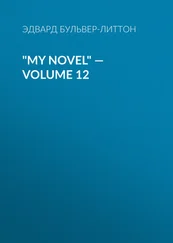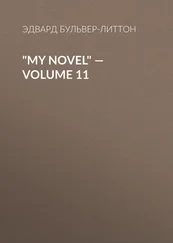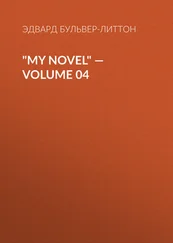Эдвард Бульвер-Литтон - My Novel — Complete
Здесь есть возможность читать онлайн «Эдвард Бульвер-Литтон - My Novel — Complete» — ознакомительный отрывок электронной книги совершенно бесплатно, а после прочтения отрывка купить полную версию. В некоторых случаях можно слушать аудио, скачать через торрент в формате fb2 и присутствует краткое содержание. Жанр: foreign_prose, literature_19, Европейская старинная литература, foreign_antique, на английском языке. Описание произведения, (предисловие) а так же отзывы посетителей доступны на портале библиотеки ЛибКат.
- Название:My Novel — Complete
- Автор:
- Жанр:
- Год:неизвестен
- ISBN:нет данных
- Рейтинг книги:5 / 5. Голосов: 1
-
Избранное:Добавить в избранное
- Отзывы:
-
Ваша оценка:
- 100
- 1
- 2
- 3
- 4
- 5
My Novel — Complete: краткое содержание, описание и аннотация
Предлагаем к чтению аннотацию, описание, краткое содержание или предисловие (зависит от того, что написал сам автор книги «My Novel — Complete»). Если вы не нашли необходимую информацию о книге — напишите в комментариях, мы постараемся отыскать её.
My Novel — Complete — читать онлайн ознакомительный отрывок
Ниже представлен текст книги, разбитый по страницам. Система сохранения места последней прочитанной страницы, позволяет с удобством читать онлайн бесплатно книгу «My Novel — Complete», без необходимости каждый раз заново искать на чём Вы остановились. Поставьте закладку, и сможете в любой момент перейти на страницу, на которой закончили чтение.
Интервал:
Закладка:
Our poor friend Lenny drew plenty of this stuff from the tinker’s bag. He thought it very clever and very eloquent; and he supposed the statistics were as true as mathematical demonstrations.
A famous knowledge-diffuser is looking over my shoulder, and tells me, “Increase education, and cheapen good books, and all this rubbish will disappear!” Sir, I don’t believe a word of it. If you printed Ricardo and Adam Smith at a farthing a volume, I still believe that they would be as little read by the operatives as they are nowadays by a very large proportion of highly-cultivated men. I still believe that, while the press works, attacks on the rich and propositions for heave-a-hoys will always form a popular portion of the Literature of Labour. There’s Lenny Fairfield reading a treatise on hydraulics, and constructing a model for a fountain into the bargain; but that does not prevent his acquiescence in any proposition for getting rid of a National Debt, which he certainly never agreed to pay, and which he is told makes sugar and tea so shamefully dear. No. I tell you what does a little counteract those eloquent incentives to break his own head against the strong walls of the Social System,—it is, that he has two eyes in that head which are not always employed in reading. And having been told in print that masters are tyrants, parsons hypocrites or drones in the hive, and landowners vampires and bloodsuckers, he looks out into the little world around him, and, first, he is compelled to acknowledge that his master is not a tyrant (perhaps because he is a foreigner and a philosopher, and, for what I and Lenny know, a republican). But then Parson Dale, though High Church to the marrow, is neither hypocrite nor drone. He has a very good living, it is true,—much better than he ought to have, according to the “political” opinions of those tracts! but Lenny is obliged to confess that if Parson Dale were a penny the poorer, he would do a pennyworth’s less good; and comparing one parish with another, such as Rood Hall and Hazeldean, he is dimly aware that there is no greater CIVILIZER than a parson tolerably well off. Then, too, Squire Hazeldean, though as arrant a Tory as ever stood upon shoe-leather, is certainly not a vampire nor blood sucker. He does not feed on the public; a great many of the public feed upon him: and, therefore, his practical experience a little staggers and perplexes Lenny Fairfield as to the gospel accuracy of his theoretical dogmas. Masters, parsons, and landowners! having, at the risk of all popularity, just given a coup de patte to certain sages extremely the fashion at present, I am not going to let you off without an admonitory flea in the ear. Don’t suppose that any mere scribbling and typework will suffice to answer the scribbling and typework set at work to demolish you,—write down that rubbish you can’t; live it down you may. If you are rich, like Squire Hazeldean, do good with your money; if you are poor, like Signor Riccabocca, do good with your kindness.
See! there is Lenny now receiving his week’s wages; and though Lenny knows that he can get higher wages in the very next parish, his blue eyes are sparkling with gratitude, not at the chink of the money, but at the poor exile’s friendly talk on things apart from all service; while Violante is descending the steps from the terrace, charged by her mother-in-law with a little basket of sago, and such-like delicacies, for Mrs. Fairfield, who has been ailing the last few days.
Lenny will see the tinker as he goes home, and he will buy a most Demosthenean “Appeal,”—a tract of tracts, upon the propriety of Strikes and the Avarice of Masters. But, somehow or other, I think a few words from Signor Riccabocca, that did not cost the signor a farthing, and the sight of his mother’s smile at the contents of the basket, which cost very little, will serve to neutralize the effects of that “Appeal” much more efficaciously than the best article a Brougham or a Mill could write on the subject.
CHAPTER VIII
Spring had come again; and one beautiful May day, Leonard Fairfield sat beside the little fountain which he had now actually constructed in the garden. The butterflies were hovering over the belt of flowers which he had placed around his fountain, and the birds were singing overhead. Leonard Fairfield was resting from his day’s work, to enjoy his abstemious dinner, beside the cool play of the sparkling waters, and, with the yet keener appetite of knowledge, he devoured his book as he munched his crusts.
A penny tract is the shoeing-horn of literature! it draws on a great many books, and some too tight to be very useful in walking. The penny tract quotes a celebrated writer—you long to read him; it props a startling assertion by a grave authority—you long to refer to it. During the nights of the past winter, Leonard’s intelligence had made vast progress; he had taught himself more than the elements of mechanics, and put to practice the principles he had acquired not only in the hydraulical achievement of the fountain, nor in the still more notable application of science, commenced on the stream in which Jackeymo had fished for minnows, and which Lenny had diverted to the purpose of irrigating two fields, but in various ingenious contrivances for the facilitation or abridgment of labour, which had excited great wonder and praise in the neighbourhood. On the other hand, those rabid little tracts, which dealt so summarily with the destinies of the human race, even when his growing reason and the perusal of works more classical or more logical had led him to perceive that they were illiterate, and to suspect that they jumped from premises to conclusions with a celerity very different from the careful ratiocination of mechanical science, had still, in the citations and references wherewith they abounded, lured him on to philosophers more specious and more perilous. Out of the tinker’s bag he had drawn a translation of Condorcet’s “Progress of Man” and another of Rousseau’s “Social Contract.” Works so eloquent had induced him to select from the tracts in the tinker’s miscellany those which abounded most in professions of philanthropy, and predictions of some coming Golden Age, to which old Saturn’s was a joke,—tracts so mild and mother-like in their language, that it required a much more practical experience than Lenny’s to perceive that you would have to pass a river of blood before you had the slightest chance of setting foot on the flowery banks on which they invited you to repose; tracts which rouged poor Christianity on the cheeks, clapped a crown of innocent daffodillies on her head, and set her to dancing a pas de zephyr in the pastoral ballet in which Saint-Simon pipes to the flock he shears; or having first laid it down as a preliminary axiom that—
“The cloud-capped towers, the gorgeous palaces,
The solemn temples, the great globe itself,—
Yea, all which it inherit, shall dissolve,”
substituted in place thereof M. Fourier’s symmetrical phalanstere, or Mr. Owen’s architectural parallelogram. It was with some such tract that Lenny was seasoning his crusts and his radishes, when Riccabocca, bending his long dark face over the student’s shoulder, said abruptly,—
“Diavolo, my friend! what on earth have you got there? Just let me look at it, will you?”
Leonard rose respectfully, and coloured deeply as he surrendered the tract to Riccabocca.
The wise man read the first page attentively, the second more cursorily, and only ran his eye over the rest. He had gone through too vast a range of problems political, not to have passed over that venerable Pons Asinorum of Socialism, on which Fouriers and Saint-Simons sit straddling, and cry aloud that they have arrived at the last boundary of knowledge!
Читать дальшеИнтервал:
Закладка:
Похожие книги на «My Novel — Complete»
Представляем Вашему вниманию похожие книги на «My Novel — Complete» списком для выбора. Мы отобрали схожую по названию и смыслу литературу в надежде предоставить читателям больше вариантов отыскать новые, интересные, ещё непрочитанные произведения.
Обсуждение, отзывы о книге «My Novel — Complete» и просто собственные мнения читателей. Оставьте ваши комментарии, напишите, что Вы думаете о произведении, его смысле или главных героях. Укажите что конкретно понравилось, а что нет, и почему Вы так считаете.












